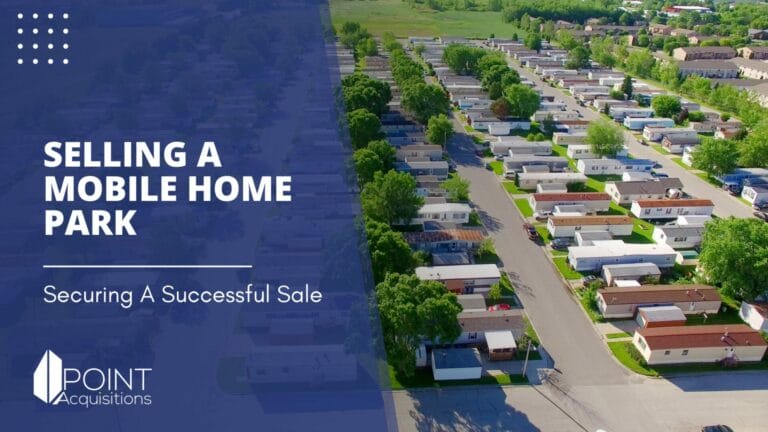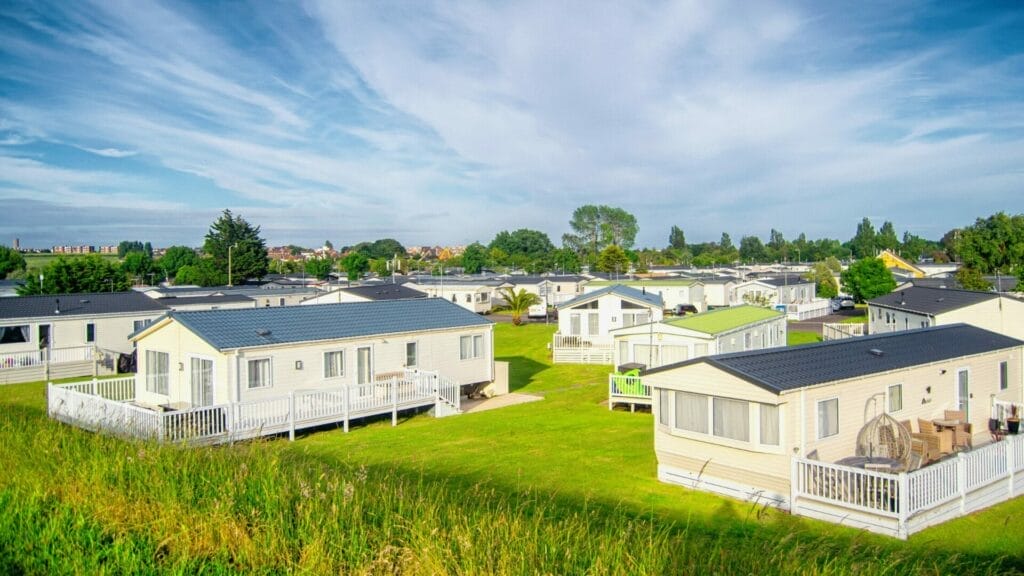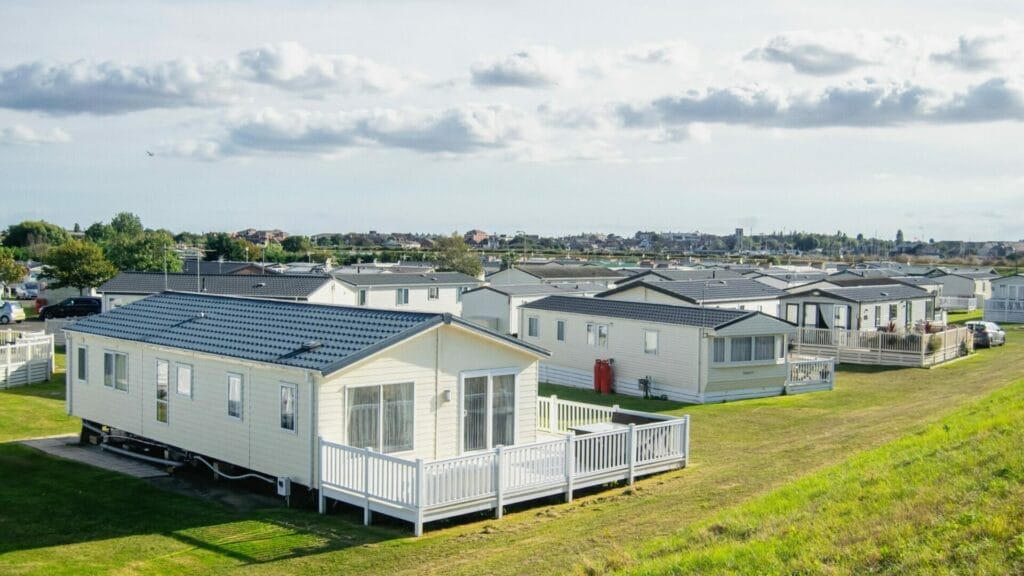
How To Sell A Mobile Home Park
Selling a mobile home park can be a complex yet rewarding endeavor. It requires a deep understanding of the real estate market and a strategic approach.
In the U.S., mobile home parks have emerged as a lucrative segment in real estate, with over 22,000 parks nationwide.
With that in mind, this article is designed to walk you through the selling process, making sure you are well-equipped at every stage. Whether you are a first-time mobile home park owner or a seasoned investor, this guide is designed to simplify and explain the sales process.
Entrusting your sale to Point Acquisitions means partnering with a team that understands the true value of your investment, guaranteeing you receive the best possible return.

Table of Contents
Key Takeaways
- Accurate pricing based on market trends and park valuation is key to a successful sale.
- Increasing park appeal through repairs and improvements significantly raises its market value.
- Targeted marketing strategies, like online platforms and professional networks, help reach the right audience.
- Skillful negotiations lead to better sale terms and prices.
- Understanding the closing process, including paperwork and legal requirements, is essential for a smooth transaction.
- Selling to Point Acquisitions guarantees a fast, efficient, and expertly handled process.
Preparing the Mobile House Park for Sale
Before listing a mobile home park for sale, thorough preparation is crucial to attract potential buyers and achieve the best price. There are various stages involved:
Conduct Necessary Repairs
Addressing maintenance issues is vital. Repairing amenities, fixing infrastructure problems, and ensuring all park-owned homes are in good condition make a significant difference.
For instance, according to real estate market trends, a well-maintained mobile home park can see an increase in value by up to 10%.
Increase Curb Appeal
First impressions matter. Improving the park’s aesthetics, like landscaping, painting, and general cleanup, will greatly increase its appeal.
A Real Estate Agent Association study suggests that parks with higher curb appeal can sell up to 15% faster than those without.
Regulatory Compliance
Compliance with local zoning and safety regulations is non-negotiable. Making sure that your mobile home park meets all regulatory standards not only avoids legal complications but also instills confidence in potential buyers.
Reports indicate that parks with up-to-date compliance are 20% more likely to attract serious inquiries.
Highlight Personal Property Upgrades
If the park includes personal property elements like community centers or pools, showcasing any upgrades or features can add to the property’s attractiveness.
Use Professional Services
Selling to a buyer like Point Acquisitions, can provide essential insights into the selling process. Our expertise in the real estate market, especially around mobile homes and park-owned homes, is invaluable in preparing for a sale.
Document Financial and Operational Records
Clear and organized records of rent rolls, tax returns, and maintenance expenses provide transparency and can accelerate the sales process.

Setting the Right Price
Determining the right price for your mobile home park is a critical step in the selling process. Setting a price that accurately reflects the park’s value guarantees a fair deal for both the seller and the buyer. This stage requires a careful analysis of various factors:
Understanding Market Valuation
Market valuation involves assessing the mobile home park market’s current demand and supply dynamics. Factors such as the park’s location, the condition of park-owned homes, and the stability of tenancies play a significant role.
According to industry reports, the average sale price of mobile home parks in the U.S. has been steadily increasing, with recent figures indicating an average of around $35 per lot per month.
Comparing Similar Parks
Benchmarking your park against similar properties in the area or region is essential. This comparison should consider:
- the park’s size
- the number of lots,
- amenities provided
- occupancy rates
For instance, parks with high occupancy rates and modern amenities can command higher prices.
Location and Amenities
The location of your mobile home park significantly influences its value. Parks in areas with robust economic growth, good infrastructure, and accessibility to amenities like schools and shopping centers are more valuable.
Additionally, parks offering amenities like community centers, pools, or recreational areas can attract a premium.
Adjusting for Market Trends
Keeping abreast of current real estate market trends is important. In a seller’s market, where demand exceeds supply, prices can be set higher. Conversely, more competitive pricing may be necessary in a buyer’s market.
Setting the right price for your mobile home park is more than just assigning a number; it’s about understanding the market, comparing relevant data, and considering unique park features.

Marketing and Advertising the Mobile Home Park
Effectively marketing and advertising your mobile home park is essential for attracting potential buyers and ensuring a successful sale. Here are specific strategies and tips to maximize viewership and appeal to the right audience:
- Leverage Online Listings: Using online real estate platforms is crucial. Websites like Zillow, Realtor, and niche sites focused on mobile home parks are effective for reaching a broad audience. For instance, a listing on MHVillage, a specialized site for mobile homes, can significantly increase visibility.
- Social Media Marketing: Harness the power of social media platforms like Facebook, Instagram, and LinkedIn. Create posts showcasing your park’s features and share them in relevant groups or through paid advertisements. A park owner in Florida gained significant interest by regularly posting updates and virtual tours of their park on social media, resulting in increased inquiries.
- Professional Photography and Videography: High-quality photos and videos are non-negotiable. They should highlight the park’s best features, including amenities and recent upgrades. Consider hiring a professional photographer; a study showed that real estate listings with professional photos sell 32% faster.
- Detailed Descriptions: Write compelling and detailed descriptions for your listings. Include information about the park’s location, amenities, lot sizes, community events, and unique selling points. A mobile home park in Texas emphasized its proximity to a popular city and its state-of-the-art playground, which resonated well with potential buyers.
- Virtual Tours: Offering virtual tours can significantly enhance your listing. This allows potential buyers to explore the park remotely, a feature that has become increasingly important recently.
- Networking with Real Estate Agents: Build relationships with agents specializing in mobile homes and manufactured homes. Their network and expertise can be instrumental in reaching potential buyers. Remember the associated costs that come with working alongside agents and brokers.
- Signage and Local Advertising: Consider traditional methods like signage at the park entrance and local newspaper ads. These can attract local investors or buyers who prefer more conventional property search methods.
- Word of Mouth: Encourage current residents to spread the word. Sometimes, the best leads come from within your community.
- Regular Updates: Keep your listings and social media posts updated with the latest information and seasonal photographs to maintain interest.
By employing a combination of these strategies, you can significantly improve the visibility and attractiveness of your mobile home park to potential buyers. Remember, the goal is to present your property in the best light possible, reaching the right audience through traditional and digital marketing tactics.
Negotiating with Potential Buyers
Effective negotiation is a vital component in the process of selling a mobile home park. It’s where the interests of the seller and buyer converge, and the final sale terms are determined. Navigating this phase skillfully leads to a successful and satisfactory outcome for both parties.
Understand Buyer Motives
Knowing what drives potential buyers is key. Are they looking for an investment to yield long-term returns, or are they more interested in developing the land for other purposes?
For instance, an investor may focus on current occupancy rates and the potential for rent increases, while a developer might assess the land’s value for alternative uses.
Set Clear Objectives
Before entering negotiations, clearly understand your minimum acceptable price and terms. This clarity helps in steering the negotiation effectively.
Flexibility and Compromise
Be prepared to negotiate on various aspects like price, payment terms, and the timeline for closing the sale. Flexibility can encourage a deal, especially in a competitive market.
Overcoming Common Challenges
Sellers often need help with lowball offers or buyers demanding unreasonable terms. A useful strategy is to justify your asking price with solid data, like market trends and recent sales of comparable parks.
Professional Assistance
While negotiating, challenges like emotional attachment to the property or lack of market knowledge can hinder a seller’s ability to strike the best deal. Working with a broker could be beneficial. However, it’s important to remember that brokers also mean additional fees and sometimes prolonged processes.
Point Acquisitions as an Alternative
For those seeking a faster and more straightforward selling experience, Point Acquisitions offers an alternative to traditional selling and negotiating routes.
Selling directly to Point Acquisitions eliminates the common hurdles of the negotiation process, offering a quick, fair, and transparent deal. This route is particularly beneficial for sellers looking to avoid the complexities and time-consuming aspects of negotiation with various potential buyers.
Communication is Key
Effective communication throughout the negotiation process is crucial. Be clear, concise, and consistent in your communication to avoid misunderstandings and build trust with the buyer.
Negotiating the sale of a mobile home park requires a blend of strategy, understanding of the market, and effective communication. While brokers can provide expertise and support in negotiations, companies like Point Acquisitions offer a direct and simplified alternative, potentially saving time and reducing complications in the sales process.

Closing the Sale and Transferring Ownership
Finalizing the sale of a mobile home park and transferring ownership are pivotal steps in the selling process. This stage solidifies the agreement reached during negotiations and legally transfers the property to the new owner. Understanding the closing process is essential for a smooth transition.
- Finalizing the Paperwork: The first step is making sure all necessary paperwork is in order. This includes the sales contract, disclosure statements, and other relevant legal documents. These documents outline the terms of the sale, the responsibilities of both parties, and any warranties or guarantees.
- Working with a Title Company: A title company plays a critical role in closing. They conduct a title search to make sure there are no liens or claims against the property and provide title insurance to protect against future disputes. They also smooth over the transfer of funds and property.
- Handling Closing Costs: Closing costs include title insurance, attorney fees, and transfer taxes. It’s important to understand which costs you are responsible for as a seller. Typically, sellers may pay for the title insurance and some escrow fees.
- Average Timeline for Closing: The timeline for closing a sale can vary, but it generally takes 30 to 60 days from the acceptance of the offer to the final closing. This timeframe allows for completing inspections and appraisals, securing financing (if applicable), and preparing the necessary documents.
- Final Walk-Through and Settlement: A final walk-through is usually conducted to ensure the property is in the agreed-upon condition before the closing date. On the closing day, both parties meet to sign the final documents, and the ownership is officially transferred.
- Post-Closing Responsibilities: After closing, completing any post-closing obligations, like providing necessary documents to the new owner or settling any remaining financial matters, is important.
Closing the sale of a mobile home park is a detailed and legally binding process, requiring attention to detail and following legal requirements. Understanding each step, from preparing the paperwork to handling closing costs, guarantees a transparent and efficient transfer of ownership.
Selling a Mobile Home Park on Leased Land
Selling a mobile home park on leased land involves unique complexities and considerations. The foremost aspect to address is the lease terms of the land.
These terms can significantly impact the sale, as they dictate the duration, rent, and conditions under which the park operates. Potential buyers will closely scrutinize these terms to understand their long-term implications.
Additionally, obtaining permission from the landowner or landlord is crucial. This may include negotiating terms of lease transfer or renewal, which can be a key factor in the sale.
It’s also important to communicate the nature of the lease to potential buyers, making sure they are fully aware of their rights and responsibilities.
Sellers should also consider any restrictions or conditions in the lease that might affect the sale or future operations of the park. Understanding and transparently presenting these elements are vital in successfully selling a mobile home park on leased land.
Conclusion
In conclusion, selling a mobile home park, often referred to colloquially as a trailer park, involves several critical steps. From understanding the market valuation to effectively marketing the property, preparing the park for sale, and skillfully negotiating with potential buyers, each stage plays a vital role in securing a successful sale.
It’s important to remember that mobile homes are often considered personal property, which can influence property taxes and the overall selling process.
Point Acquisitions stands out as a reliable and efficient partner in this journey. Selling your mobile home park to Point Acquisitions means benefiting from a fair cash offer, eliminating the usual delays and uncertainties of finding the right potential buyer.
We offer a streamlined process to sell your mobile home park fast, avoiding traditional sales routes’ complexities and time-consuming aspects. Our expertise in dealing with property taxes and understanding the nuances of mobile home parks as personal property is invaluable.

FAQs
How long does it typically take to sell a mobile home park?
The time it takes to sell a mobile home park can vary depending on market conditions, park valuation, and how well the park is prepared for sale. Generally, it takes about 30 to 60 days from listing to closing. However, selling to a direct buyer like Point Acquisitions can significantly speed up this process.
What are the key factors that affect the value of a mobile home park?
Several factors influence the value of a mobile home park, including its location, the condition and number of park-owned homes, occupancy rates, amenities offered, and compliance with regulatory standards.
Can I sell my mobile home park if it’s on leased land?
Yes, you can sell a mobile home park on leased land, but it involves additional considerations. You need to review the lease terms and may require permission from the landowner.
Why should I consider selling my mobile home park to Point Acquisitions?
Selling to Point Acquisitions offers several advantages. We provide a fair offer, guaranteeing a quick and straightforward sales process. This eliminates the need for extensive marketing, negotiations with multiple buyers, and the usual delays in the traditional selling route.
About The Author

Jesse Shemesh
Disclaimer
Please note that Point Acquisitions is not a tax expert or tax advisor. The information on our blogs and pages is for general informational purposes only and should not be relied upon as legal, tax, or accounting advice. Any information provided does not constitute professional advice or create an attorney-client or any other professional relationship. We recommend that you consult with your tax advisor or seek professional advice before making any decisions based on the information provided on our blogs and pages. Point Acquisitions is not responsible for any actions taken based on the information provided on our blogs and pages.
1031 Exchange Capital Gains Tax Deferral
According to a 2021 report by the National Real Estate Exchange Services (RES), over 240,000 1031 exchange transactions were completed in the United States, totaling $100 billion. This impressive figure underscores the role of 1031 exchanges in the real estate…
Read More1031 Exchange Benefits
As of Q4 2023, the national vacancy rate for all commercial property types in the United States sat at 9.2%, according to CBRE’s latest insights and research. This represents a slight decrease compared to the previous quarter and suggests a…
Read More1031 Exchange Legal Considerations: A Must-Read Guide
You’re in the right place if you’re considering a 1031 exchange for your commercial real estate investments. Whether you’re a seasoned investor or just dipping your toes into the market, understanding the legal landscape of 1031 exchanges is key to…
Read More

